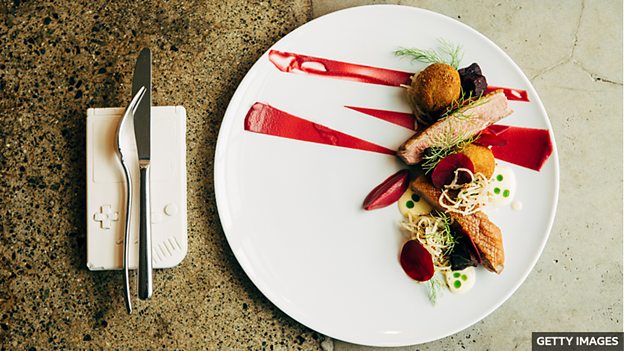英语大破解
When does cooking become molecular gastronomy? 烹饪何时变成了分子美食学?

本集内容
When does cooking become molecular gastronomy? 烹饪何时变成了分子美食学?
文字稿
A kitchen or a lab?
这到底是厨房还是实验室?
This is what happens when science meets culinary arts.
当科学邂逅美食艺术的时候,就会产生这样的结果。
It's called molecular gastronomy.
这叫“分子美食学”。
A movement that incorporates science in the preparation and artistic presentation of food.
它是一个将科学融入食物制作及艺术食品外观的发展方向。
These tourism students in Serbia are here to learn the basics.
这些塞尔维亚的旅游专业学生正在这里学习一些基本的知识。
They are going to make a Greek salad.
他们要做希腊沙拉。
The recipe usually includes tomatoes, cucumbers, feta cheese, red onions, olive oil and oregano.
该食谱通常包括西红柿、黄瓜、羊奶酪、红洋葱、橄榄油和牛至叶。
Marko Martinović, Cookery professor
“Molecular cooking is a combination of laboratory and kitchen, so we use instruments from physics and chemistry labs, and additives which provide certain characteristics to the ingredients we use. For example, we did not use slices of fresh tomatoes, but we produced tomato jelly, or gel. We did not add oregano in the usual way, but we made oregano tea that had been cooked in tomato water. We also made red onion foam. Red onion is traditionally sliced and added as rings, but we processed it and presented it in a different way, and kept the smell and aroma.”
马可·马丁诺维奇 烹饪学教授
“分子烹饪是实验室跟厨房的结合,因此我们会使用物理和化学实验室的仪器,并添加一些能赋予某些特性的添加剂到我们使用的食材中。比如说,我们没有使用新鲜的西红柿切片,但是我们制作了番茄果冻。我们没有按照常规做法加入牛至叶,而是用番茄水煮了牛至叶茶。我们还制作了红洋葱泡沫。传统的做法是把红洋葱切片制成洋葱圈后加入,但是我们对它进行了加工,以不同的方式呈现并保留了它的气味和香气。”
The term 'molecular gastronomy' was coined in 1988 by physicist Nicholas Kurti and chemist Hervé This.
“分子美食学”这一术语是由物理学家尼克拉斯·科蒂和化学家何维·蒂斯于 1988 年创造的。
They explored the science behind traditional cooking methods. But its precise techniques bring the costs up, and the meals can be expensive.
他们探索了传统烹饪方法背后的科学原理。但是其中的精准技术增加了烹饪成本,饭菜可能会因此变得很昂贵。
Many believe molecular gastronomy is only for the rich. Molecular gastronomists don't agree.
很多人觉得分子美食学只为富人专享。然而,分子美食学家不同意这一观点。
Marko Martinović, Cookery professor
“Today, we came to a universal conclusion that molecular gastronomy is not exclusive any more, but rather its scientific techniques are used to improve the quality and presentation of traditional meals. It is very important that everything is measured. We must abide by the procedure and precise time. All of this was researched scientifically. If you deviate a bit from the process itself, the result will not be the same.”
马可·马丁诺维奇,烹饪学教授
“今天,我们得出一个普遍的结论:分子美食学不再只是某些人的专属,实际上它采用的科学技术可用于改善传统美食的质量和外观。烹饪过程中的一切都要经过精确的计量,这非常重要。我们必须遵守严格的程序和精准的时间。这一切都是经过科学研究的。如果你对程序有一丝的偏离,结果都不会一样。”
A Greek salad with a stronger flavour and in a different shape and form.
这道希腊沙拉的味道更浓郁一些,形状和形式也与众不同。
But is it more about science and art than everyday meals?
但它是不是更具有科学和艺术性,而不是为了满足日常餐饮呢?